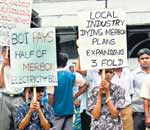Malaysian firm moves court A Malaysian-based company producing MDF boards for export, which drew the ire of local furniture manufacturers when it was launched, has obtained a court injunction against a decision by the Board of Investment (BOI) to shut down the six-year old business owing to non-payment of dues and violation of the BOI contract.
Merbok MDF Lanka Private Ltd obtained an enjoining order two weeks ago after the BOI suspended all its services to the company following the company’s non payment of Rs 54 million owed to the BOI from ground rent, water rent and bungalow rent arrears. On Friday the court order – restoring the services – was extended till August 22. Even though the company evaded the payment of dues to the BOI, Merbok took the BOI to the International Chamber of Commerce Court of Arbitration claiming a sum of Rs 179 million due on the CEB tariff subsidy. However the BOI claimed that the clause on the subsidy in agreement is ultra-vires and that the BOI is not liable to pay. The tribunal hearing has been fixed for November in Colombo. While BOI officials explained the current dispute, The Sunday Times FT’s efforts to talk to Merbok chairman Robert Kokshoorm failed. After several attempts to reach him as other company officials declined to comment, the Merbok chairman told the newspaper on Friday, “I decline to comment.” The company located in the Enterprise Zone in Horana began in 2000 with ‘very special’ concessions granted by the BOI. “Extraordinary concessions were given to this company by the BOI when they started. The BOI has no authority to grant such privileges,” said Dr. Bandula Perera, the BOI’s Additional Director-General. Industry sources said Merbok Lanka, under the BOI agreement, was given 437 acres of land at an extra ordinary premium of one dollar per acre and an annual ground rent of one dollar per acre and a special CEB tariff subsidy. Further the BOI had agreed to pay the full cost of two generators while extra land was given free of charge. “Unpaid bills are our main concern we have asked for our dues and also told them that the agreement is ultra-vires,” said Perera. However there is also a major concern about the impact the company’s presence has had on the entire industry. “Small timers have lost far more jobs than this company has created and the rubber plantation land has also reduced drastically during the time of Merbok Lanka’s presence,” the senior BOI official said. Under the agreement, Merbok was to manufacture 300,000 cubic metres per annum of wood based fibre board and associated value products. It was given exclusive rights for 10 years to export products from local rubber wood while others were barred from using rubber wood resources within a radius of 150 km from the Horana Zone in excess of 400,000 cubic metres – a decision that saw furniture manufacturers complaining about the project because there was already a shortage of raw material. On Wednesday, members of the Rubber Plantation Protection Organization with the support of the Wood Based Industrialists Association launched a protest at the Colombo Fort railway station urging the authorities to close the factory as it affected their livelihood. Local rubber wood based industrialists have been struggling as the primary source material for their industry, rubber wood, has been in short supply due to Merbok Lanka’s excessive consumption of the material. About 500 small industries’ manufacturing products such as brush blocks, wooden toys, pallets, furniture and other similar products both for the local and export market and about 150 saw mills have all closed down after Merbok began production. There is a growing demand in Sri Lanka for MDF (Medium Density Fibre) boards due to the shortage of hardwood timber. These boards are imported from Australia, New Zealand, South Africa and Malaysia “The local industry would be doing much better if they were given one fraction of the type of concessions given to Merbok Lanka. Comparatively they are getting much more than the local companies ever get, which is mostly the case with foreign investors; however they cannot hide behind the shield of a foreign investor any more. Now the BOI is taking firm steps. Foreign investors cannot violate the law and act in a detrimental way to the country,” said Patrick Amarasinghe, former president of the Furniture Manufacturers Association. He said they protested against Merbok Lanka before the signing of the agreement because the local industry would suffer but the BOI went ahead. “Now the entire furniture industry is suffering,” Amarasinghe said adding that the availability of rubber wood has gone down to such an extent that even Merbok will face difficulties unless they import the raw material. A committee appointed by the Ministry of Plantations to remedy the issue of shortage of raw materials had recommended sharing the limited rubber wood resources but Merbok was not in agreement. “This type of industry should not be brought in. We should select industries that suit the country and we should also have a level playing field for all investors in the industry,” said Perera from the BOI. |
||||
Copyright © 2006 Wijeya Newspapers
Ltd. All rights reserved. |
